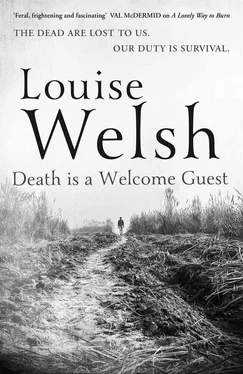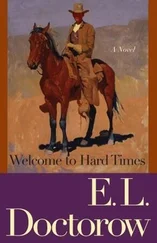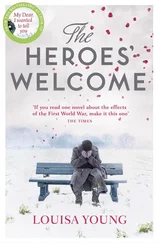The mobile phone Jeb had taken from the dead man in the subway carriage was sitting on the bedside table. Magnus wrapped a towel around his waist, sat on the edge of the bed and turned it on. He could hear his mother’s telephone ringing, far away across land and water. For a moment Magnus pictured the old Trimphone that used to sit in the lobby, but it had gone years ago, banished by a cordless phone. His mother might have mislaid the handset. That was the trouble with these cordless numbers: you set them down somewhere and couldn’t put your hands on them when they rang. His mother could be dashing between the kitchen and sitting room right now, looking for it.
The answering service came on. ‘Hello, Mum?’ He hated the question mark in his voice. ‘Hi, it’s me. I hope you and Rhona are okay. There’s been a bit of bother down here, but I’m fine. I’m coming home. I’ll be with you in a couple of —’ The phone beeped, cutting him off. He tried to remember his mother’s mobile number and the number of Rhona’s phones, but they had been programmed into his own device. He had summoned them by typing in their names and had never bothered to commit them to memory.
‘Fuck.’
His mum was probably at Rhona’s right now, the pair of them worrying about him and cursing him in equal measure. Magnus dialled the only other Orkney number he knew by heart, his Aunty Gwen’s, Hugh’s mother. Once again it rang out and he left a brief message. Cordless phones were useless, he consoled himself. If the electricity went down they went with it. His mother would have done better to have stuck with the old Trimphone.
He rang 118 118, thinking he should phone the Snapper Bar, or perhaps even the police or the hospital, but they did not answer either and he switched the mobile off, scared of wasting its battery. Things would be okay, he reassured himself. He would get home to find them all waiting for him.
Jeb was sitting at a low table in the lobby where guests had once enjoyed an aperitif while they waited for cabs to take them to that evening’s destination. There was an unopened bottle of Highland Park and two whisky glasses on the table in front him. Jeb touched the neck of the malt gently with his fingertips as Magnus sat down.
‘I never had a problem with drink, how about you?’
‘I like a drink, if that’s what you mean.’
‘I meant if I open this bottle will you feel obliged to sup it all?’
There had been nights when he had killed a bottle and still been standing straight enough to make an assault on one of its comrades, but Magnus said, ‘I can take a dram and put the cap back on the bottle.’
Jeb broke the seal and poured two measures into the waiting glasses.
‘That’s what we’ll do then.’ He passed one of the charged glasses to Magnus. The malt smelled of snugs and peat fires, of funeral breath and late nights. It smelled unbearably of home and Magnus was forced to look away. He cleared his throat.
‘They made this not far from where I grew up.’ He wondered at his use of the past tense.
Jeb raised his glass. ‘To survival.’
Magnus echoed, ‘Survival.’
They both drank. Jeb nodded, as if reaffirming the toast.
‘When I first saw you, I don’t know why, but I thought you were a soft lad.’ He shrugged his shoulders. ‘Maybe it’s the accent.’
You decided before I opened my mouth, Magnus thought, I saw it in your eyes. He said nothing.
‘We’ve been through a fair bit these last couple of days.’ Jeb swirled the liquid in his glass, molten gold. This was another Jeb, no longer the sullen prison inmate or the crazed escapee armed with a ready chib. The military aspect that Magnus had noticed during their escape had returned. ‘The odds were against us, but here we are.’
‘These last days,’ Magnus said. He took a sip of his dram. The whisky stung his lips but it brightened his perceptions. He could see the five-star hotel for what it was — a folly designed to make those who could afford it feel superior. That kind of swank was in the past; they had entered a new world where the only rank was survival.
Magnus had told Jeb that he could take a measure and put the cap back on the bottle, but he wanted to drink it dry and go into battle. Let whisky be his lieutenant and his linesman. He reached out, topped up his dram and gestured the bottle towards Jeb’s glass. The other man shook his head.
‘I’m not used to it.’
Magnus asked, ‘How long were you inside?’
‘I’d done three years, most of it in solitary.’
‘So you’re either a bad bastard, or an antisocial bastard.’
‘A bit of both.’
The whisky was working on Magnus. He asked, ‘What did you do?’
Jeb’s voice was dangerously even. ‘Like I said before, nothing you need to worry about. I ended up on the wrong side of the law, just like you. That’s all you need to know.’
This was prison morality, Magnus supposed. Torture, robbery, extortion, violence of every stamp was tolerable, as long as the victims were male and over-age.
Jeb continued, ‘What I was trying to say is, I can survive on my own—’
‘Me too.’ Magnus tipped back the last of his drink and reached for a refill, but the bottle was gone. His eyes met Jeb’s.
‘We need to stay straight,’ Jeb said.
‘That’s your opinion.’
Jeb shook his head. ‘It’s like you’re determined to make me change my mind. What I was going to say is, I can survive on my own, we both can, but we stand more chance together. At least until we make it out of London and work out what’s going on in the rest of the country.’
‘Going to organise a census, are you?’ The over-patterned lounge seemed to sneer at them. Magnus wanted to take Jeb’s penknife and shred the complacent cushions, tear the curtains, stain the carpets with red wine and worse.
‘You should listen to your friend,’ an American voice said. ‘Two heads are better than one.’
Magnus turned and saw an old man leaning out of a winged armchair.
Jeb had sprung to his feet at the sound of his voice, but the man’s age must have reassured him, because he sank back down into his seat, slowly. ‘How long have you been there?’ he asked.
‘Long enough to know you were both in jail when this kicked off. You missed a time, boys.’ He raised a drink to his mouth and Magnus realised that he was drunk. Not quite fleeing, but most definitely three sheets to the wind. ‘Yes, boys,’ the man repeated softly. ‘You surely missed a time.’
The old man’s name was Edgar Prentice, ‘Eddie to my friends’. He was a professor in English Literature at Dartmouth College and lived in Norwich, New Hampshire. ‘A nice town, but sleepy. You want an injection of culture then you get yourself to Boston or New York, Europe if you’re lucky. I thought I was lucky.’ Eddie had brought a loaded martini glass and a cocktail shaker over to their table. He raised his drink to his lips. ‘Except the day before we were due to travel to London, my wife came down with a fever. I was all for cancelling, but Miriam wouldn’t hear of it. She changed her ticket to a later flight, our daughter came to visit and I flew over on my own. Worst decision of my life.’
Magnus asked, ‘How are they?’
The old man knocked back the last of his drink and refreshed his glass from the silver shaker. He was taller than any of the pensioners Magnus had grown up around, but his clothes hung loose on his bones and Magnus guessed that he too had recently lost weight. Eddie said, ‘I anticipate a whole new set of taboos in this brave new world of ours. Asking about a man’s family is going to be one of them.’ He looked Magnus in the eye.
Magnus said, ‘I was hoping immunity might run in families.’
Читать дальше












